APRIL 19, 2025


CANDID PERSPECTIVES tHe terriFying tariFFs


BIBLE REFLECTIONS
tHe resurrection is Here: Living tHe power oF easter every day
BOOK REVIEW My angkong’s noodLes


OPEN FORUM
Let’s Focus on HeLping, not Hurting, Hawaii Businesses

APRIL 19, 2025


CANDID PERSPECTIVES tHe terriFying tariFFs


BIBLE REFLECTIONS
tHe resurrection is Here: Living tHe power oF easter every day
BOOK REVIEW My angkong’s noodLes


OPEN FORUM
Let’s Focus on HeLping, not Hurting, Hawaii Businesses
There have been close to two dozen Philippine Consuls General in Honolulu since 1946 and we extend a warm welcome to the new Consul General Arman R. Talbo who assumed the post on March 18, 2025.
The Philippine Consulate General was accredited with the United States in January 1947 when Hawaii was then a territory. Hawaii became a state in 1959.
In the nascent years when Hawaii’s Filipino community’s roots were beginning to implant and decades before the Filipino Community Center, it was the Philippine Consulate General on 2433 Pali Highway that served as a popular meeting place for Filipino clubs and organizations.
Those days have long gone, supplanted by the FilCom Center as a primary meeting place. But the Consulate’s imposing colonial white mansion with its iconic columns surrounded by majestic palm trees that arouse nostalgia among many old-timers in our Filipino community still serves as an important place for Filipinos in Hawaii, especially for Philippines nationals, dual citizens, Overseas Filipino Workers (OFWs) and Filipinos and non-Filipinos engaged in Philippine interests like business or U.S.-Philippines government matters.
The U.S. is the Philippines third largest trading partners and the Philippine Consulate General in Honolulu helps to promote trade relations between business owners in Hawaii and their counterparts in the Philippines.
One notable event to encourage local Hawaii residents and businesses to buy Philippines food products and to bolster potential business between Philippine-based companies and local eateries is the annual Filipino Food Week that the Hawaii Filipino Chronicle helps to promote.
Filipino Food Week that the Consulate puts together invites popular Filipino restaurants and non-Filipino restaurants statewide to offer special Filipino cuisine for a week.
Another major event that still draws in a crowd coordinated by the Philippine Consulate General in Honolulu is the annual Philippine Independence Day celebration. This year, the 127th Philippine Independence Day celebration, will be held in June at the Coral Ballroom, Hilton Hawaiian Village, and hosted by the new Consul General who already has been working with the Philippine Celebrations Coordinating Committee of Hawaii (PCCCH) on this event.
A community event Talbo took part in recently is the Filipino Chamber of Commerce Fellows – Destiny Class recognizing those who completed the leadership program. Talbo noted that Filipino Americans can uplift both communities. He said that the fellows

HPublisher & Executive Editor
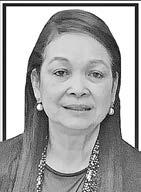
awaii’s Filipino community has had many leaders, those in medicine from the Philippines Medical Association of Hawaii (PMAH), or in business from the Filipino Chamber of Commerce of Hawaii, and so on. Over the decades since 1946, we’ve also had many Philippine Consuls General counted among those who’ve enriched our community. For our cover story this issue, we’re pleased to introduce to our readers the new Consul General Arman R. Talbo. HFC columnist Carlota Ader reports on Talbo’s priorities during his tenure here and gives us his illustrious diplomatic background with his most recent post having served as Deputy Consul General in New York. Welcome to Hawaii Consul General Talbo. Our community looks forward to working with you and wishes you much success.
One goal of the Philippine Consulate General in Honolulu is to bolster economic opportunities in trade between local businesses and their counterparts in the Philippines, including the import of Philippines food products. HFC columnist Emil Guillermo explores how President Donald Trump’s increased tariffs could hike the prices of imported goods like macapuno or ube at local Philippine grocery stores. From an international perspective, HFC columnist Seneca Moraleda-Puguan who is based in Switzerland, says that the global trade wars even have Europe uneasy of what’s to come especially now that China has retaliated to the Trump tariffs.
Speaking of China, HFC columnist Rose Cruz Churma gives us a fascinating book review on “My Angkong’s Noodles,” which is more than a cookbook of Filipino-Chinese dishes, but it also delves into Chinoy (slang for Filipino-Chinese) culture and history. In the book’s preface, it’s said Chinese merchants traded with the Philippines as early as the 8th century, although documentation of Chinese presence is only available by the 11th century.
Also in this issue, we have HFC contributor Dr. Dylan Bothamley’s “Curling Gold at The Winter Games,” recapping the Philippines first-ever gold medal at the 9th Asian Winter Games; HFC contributor Sheryll Bonilla, Esq.’s “Designating Beneficiaries” on the benefits of establishing a legal trust; and Keli‘i Akina, president of the Grassroot Institute of Hawaii, Open Forum contribution, “Let’s Focus on Helping, Not Hurting, Hawaii Businesses.” We hope you find these articles and our other news and columns informative.
Lastly, we’d like to wish everyone a Happy Easter. HFC contributor Bermie Dizon expounds on the meaning of Easter in his article “The Resurrection is Here: Living the Power of Easter Every Day.” He writes, “We’re reminded that Easter is not just about looking back—it’s about living in the power of what Jesus has done. The resurrection is not only a triumph of the past; it is a present and living reality. Jesus didn’t just rise from the dead—He is the Resurrection, and He lives in us today.”
Thank you for supporting the HFC. Please visit thefilipinochronicle.com to get your free e-copy of each issue. For your advertising needs, contact us at: filipinochronicle@gmail.com. Until the next issue, Aloha and Mabuhay!

embody “the songs, hopes, and aspirations of our ancestors, the warmth of our families, the joy of our celebrations, and the deep sense of duty for our country.”
Talbo is an Ilocano native who previously served as Deputy Consul General in New York during
(continue on page 3)
Charlie Y. Sonido, M.D.
Publisher & Managing Editor
Chona A. Montesines-Sonido
Associate Editors
Edwin QuinaboDennis Galolo
Contributing
Editor
Belinda Aquino, Ph.D.
Design Junggoi Peralta
Photography
Tim Llena
Administrative Assistant
Lilia Capalad
Editorial & Production Assistant
Jim Bea Sampaga
Columnists
Carlota Hufana Ader
Rose Cruz Churma
Elpidio R. Estioko
Willie Espero
Emil Guillermo
Gary Hooser
Arcelita Imasa, M.D.
Seneca Moraleda-Puguan
J.P. Orias
Charlie Sonido, M.D.
Emmanuel S. Tipon, Esq.
Contributing Writers
Clement Bautista
Edna Bautista, Ed.D.
Teresita Bernales, Ed.D.
Sheryll Bonilla, Esq.
Dr. Dylan Bothamley
Serafin Colmenares Jr., Ph.D.
Linda Dela Cruz
Carolyn Weygan-Hildebrand
Amelia Jacang, M.D.
Caroline Julian
Max Levin
Raymond Ll. Liongson, Ph.D.
Federico Magdalena, Ph.D.
Matthew Mettias
Maita Millalos
Paul Melvin Palalay, M.D.
Renelaine Bontol-Pfister
Seneca Moraleda-Puguan
Jay Valdez, Psy.D.
Amado Yoro
Philippine Correspondent:
Greg Garcia
Neighbor Island Correspondents:
Big Island (Hilo and Kona)
Grace LarsonDitas Udani
Kauai
Millicent Wellington
Maui
Christine Sabado
Big Island Distributors
Grace LarsonDitas Udani
Kauai Distributors
Amylou Aguinaldo
Nestor Aguinaldo
Maui Distributors
Cecille PirosRey Piros
Molokai Distributor
Maria Watanabe
Oahu Distributors
Yoshimasa Kaneko
Shalimar / Jonathan Pagulayan
Advertising / Marketing Director
Chona A. Montesines-Sonido
Account Executives
Carlota Hufana Ader
JP Orias
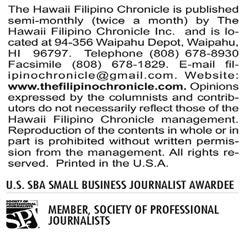
Economists are mostly in agreement that President Donald Trump’s broad tariffs could potentially do irreparable harm to the U.S. in the long-term as global investors will now rethink their strategy of investing in the U.S. and potentially seek other markets that are more stable and predictable.
What made global investors bullish about investing in the U.S. is our country’s stability, certainty, and adherence to the rule of law. Whether the U.S. had a Democrat or Republican leader, investors could trust that the economy would remain stable enough that corporations would have time to adjust to a new administration’s economic policies and weather dramatic changes.
Economists say this is now in doubt. The unpredictability of Trump’s tariffs, green-lighting, red-lighting, even gas-lighting, coupled with Trump’s boldness to exact extreme measures –all of these are working to undermine the decades of trust our global investors have had in the U.S. market.
And contrary to Trump’s assertion that America will be better off in the future while his tariff adjustments sink in,
(Arman...from page 2)
an important time in history. “I was there during the COVID pandemic and the surge of Asian hate cases,” he said. “But I am sure that my assignment here in Honolulu will shape up to be one of the best, as I can already feel the energy of our huge Filipino population in the islands. I am so excited to work with everyone.”
Prior to New York,
experts are saying the socalled long-term benefits of his tariff wars are questionable.
Trump’ rationale, his endgame for the tariff war is to bring manufacturing back to the U.S. This is a noble goal, something that even Democrats after President Bill Clinton (who is largely responsible for pushing the U.S. into economic globalization) have tried to recapture.
But economic globalization wherein manufacturing is done in multiple countries before a final product is completed – is almost impossible to reverse because of cheaper labor and cheaper operational costs abroad. Capitalism is competition and capitalists will seek the highest profit even if it means going to another country.
Furthermore, other countries have developed the tech and know-how, as well as the fluidity to move products globally that makes the U.S. no longer the main and only source for massive market profit. On top of that, certain manufacturing left the U.S. in the first place because most Americans refuse to do tedious, low-paying work. There is also the
he served as Vice Consul in Barcelona, Spain. He received a Business Administration and Accountancy degree, as well as his Juris Doctor.
He told the Hawaii Filipino Chronicle in a recent interview that his top three priorities as new Consul General include the preservation and enhancement of national security, the promotion
consideration to factor in that heavy manufacturing is moving toward AI-Robotics which will negate the purpose of increased jobs in manufacturing.
Besides the U.S. losing our reputation as a stable market to invest, experts say the other major long-term damage –perhaps more damaging -- is many of our trustworthy trading partners like Canada, Mexico, the EU, Japan, South Korea, ASEAN-nations are being pushed into the arms of China, our largest economic global competitors.
For example, for a very first time, Japan, South Korea and China are talking and working together to come up with an East-Asian response to Trump’s tariffs. Remember, Japan and South Korea have been at odds with China for decades. It’s also worth mentioning that Japan and South Korea are the last holdouts in Asia to open their markets in a massive way to China. The rest of Southeast Asia are already major economic partners with China. To top, ASEAN-nations have been prospering tremendously as they’ve shifted from the West to their natural (due to geography) trad-
and attainment of economic security, and the protection of the rights and promotion of the welfare and interests of Filipinos overseas—all of which form the pillars of Philippine foreign policy, Talbo says.
Like his predecessors, Talbo will lead the important services that the Consulate provides like processing applications
ing partner, China.
The BRICS factor
One cannot ignore also that there is another colossal trading bloc globally in BRICS (Brazil, Russia, India, China, and new members Egypt, Ethiopia, Iran and the United Arab Emirates) that already represent roughly 45% of the world’s population and 35% of global GDP.
The EU, Canada and Mexico – our major trading partners (along with China) -- are already trading partners with members of BRICS, a multi-country members organization with a shared vision to counter the U.S.’s economic hegemony. BRICS keeps growing each year and Trump’s tariffs could expand their market global share.
For the most part, much of Americans’ angst and criticism aimed at Trump and his tariff hikes are over the increased cost it will have on imported products. Certainly, this is rightly the number one concern in the immediate short term. Poor and working-class Americans are already being stretched – many of them living on debt and cannot
for passports, notarials, civil registration, and dual citizenship, as well as facilitating Philippines voting and voting registration to those who qualify.
The Hawaii Filipino Chronicle as well as many of our Filipino organizations and clubs look forward to working
afford higher inflation. Middle-class Americans are concerned about their 401(k) and retirement portfolios deflating, triggering panic among retirees and near-retirees. Many Americans voted for Trump to bring relief from the heavy burdens of high inflation and the high cost of essentials like grocery. Not only has Trump failed in alleviating these burdens, but his tariffs are making it worse to a point that economists and large banks are saying should we continue down this path, a recession is bound to happen. Already various industries face layoffs and factory closures due to increased costs and trade disruptions. Experts criticize the lack of a focused strategy. The irony is tariffs increase costs for U.S. manufacturers, complicating efforts to reshore manufacturing. There is a palpable sense of fear among Americans over the economy. What’s upsetting is that much of this financial hardship and anxiety – which will get worse as soon as corporations begin to adjust to the tariffs – are self-induced, triggered by Trump, who must end this chaos before irreparable damage to our country sets in.
with you, Consul Talbo. The Philippine Consulate General in Honolulu has a long-standing, iron-clad working relationship with Hawaii’s community and we’re confident that you will succeed in carrying on this tradition. Let’s continue to work together to foster economic opportunities and promote our Filipino culture.
By Carlota Ader
Ilocano native Arman R. Talbo assumed the top post as Consul General at the Philippine Consulate General in Honolulu on March 18.
Talbo brings decades of experience in international affairs and diplomacy, having previously served as Deputy Consul General in New York where he focused on political, economic and cultural activities, and worked closely with the Filipino community along the Eastern seaboard of the U.S.
Talbo is the 22nd Consul General in Honolulu. He joins a long list of well-known past Philippine Consuls General based in Honolulu like to name a few Juan Dionisio (1957 to 1962), Trinidad Alconcel (1966 to 1972), Tomas Gomez III (1986 to 1989), and Ariel Abadilla (2005 to 2009).
Prior to New York, Talbo served as Vice Consul in Barcelona, Spain from 2008 to 2012, and as Second Secretary at the Philippine Embassy in Madrid from 2012 to 2014. Talbo has also held several executive positions within the Department of Foreign Affairs in Manila, specifically with the Office of Fiscal Management, the Office of the Undersecretary for Administration and Office of Consular Affairs. As Deputy Chief of Presidential Protocol, he
Talbo graduated from the University of the Philippines in Diliman, Quezon City where he received a Business Administration and Accountancy degree, as well as his Juris Doctor. Among his accomplishments are passing both the CPA Board and Bar examinations.
To date, he has received a handful of com-
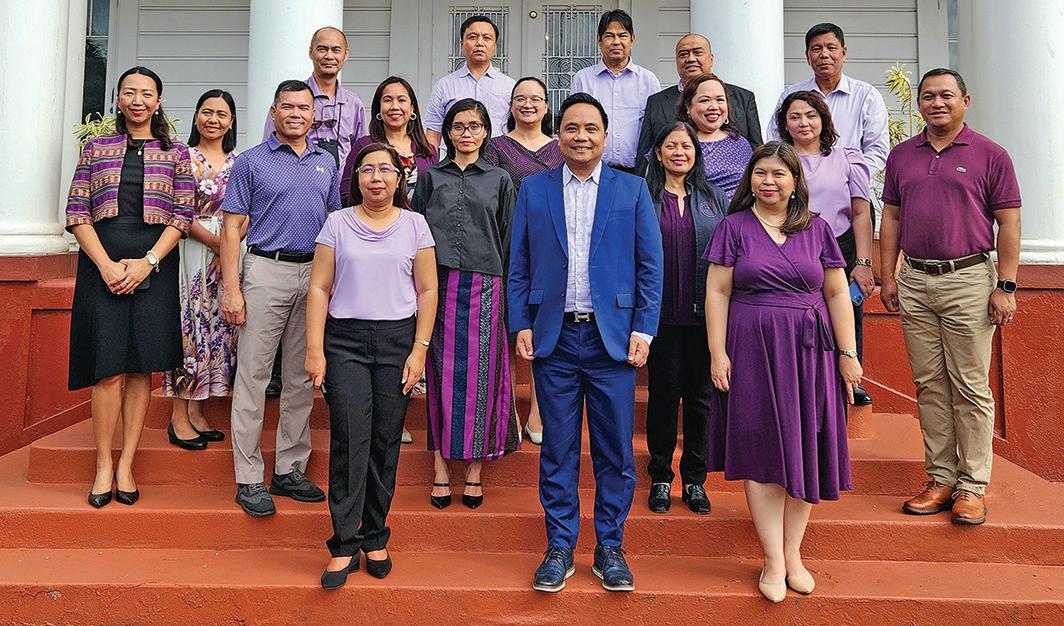
organized and ensured the smooth implementation of events attended by the President and visiting Heads of States and Governments.
His current post in Honolulu is Talbo’s first ever visit to the Aloha State. He has since attended a Catholic mass and already met several community leaders.
“Since I arrived, I have felt the very warm welcome of the different officials of Hawaii and Honolulu, as well as my counterparts in the consular corps,” he said. “Some leaders of Filipino organizations have called on me and expressed their eagerness to work with me and the Consulate. I am very happy and extremely optimistic, and even lucky, to be here as Consul General.”
Just a few weeks into his new post, Talbo hit the ground running
mendations for outstanding work, including the Gawad Mabini (Rank of Dakilang Kasugo), one of the highest awards bestowed on Filipino diplomats. Talbo has also received the Presidential Medal of Merit for his exemplary service in the Office of the President.
A career in the Foreign Service offered excitement, challenges and per-
sonal satisfaction of serving his country. For Talbo, it has been more than simply a job—it signified a way of life requiring uncommon commitment, but also bestowing unique rewards, opportunities and at times, hardships.
“I believe in the power of diplomacy in achieving our goals as a nation,” he said. “I get to work in the national and international
actively working with Hawaii’s Filipino community. In April, he met with the Philippine Celebrations Coordinating Committee of Hawaii (PCCCH) to discuss preparation for the 127th Philippine Independence Day celebration slated for June 14 at the Coral Ballroom, Hilton Hawaiian Village. He’s also met with and congratulated the new leaders of the Filipino Chamber of Commerce of Hawaii (FCCH) FellowsDestiny Class.
He told the fellows who completed the 7-month program, which aims to empower emerging Filipino leaders, that they embody “the songs, hopes, and aspirations of our ancestors, the warmth of our families, the joy of our celebrations, and the deep sense of duty for our country.”
setting with my years of experience as a diplomat, to advance the interests of the Philippines and the Filipino people.”
The Philippine Foreign Service is first and foremost a diverse corps of working professionals like Talbo who are dedicated to representing the Philippines’ interests, and responding to the needs of Philippine citizens living
and/or working in other countries.
Talbo said his New York post has so far been the most memorable because of the number of challenges he faced, as well as the opportunities that came along.
“I was there during the COVID pandemic and the surge of Asian hate cases,” he said. “But I am sure
(continue
that my assignment here in Honolulu will shape up to be one of the best, as I can already feel the energy of our huge Filipino population in the islands. I am so excited to work with everyone.”
A twice NYC marathon finisher, Talbo was called by his colleagues in New York the “indefatigable diplomat.” That label also appropriately described his work ethic.
While his official post was based in New York City, he was also known in upstate New York and neighboring states such as Connecticut, Rhode Island, Pennsylvania, and Massachusetts for his consular outreach in these communities. He said of his time working with kababyan in the U.S. Norteast, not only was it an opportunity to provide their consular needs but, more importantly, he and colleagues established lasting and productive networks which are mutually beneficial for the consulate and the groups and organizations.
He’s met with Filipino officials, personnel, and students of Harvard University, representatives of senior advocacy groups working to prevent abuses and scams perpetrated against aging citizens, owners of Filipino restaurants like Tradisyon located in the Hell’s Kitchen neighborhood of Midtown Man-
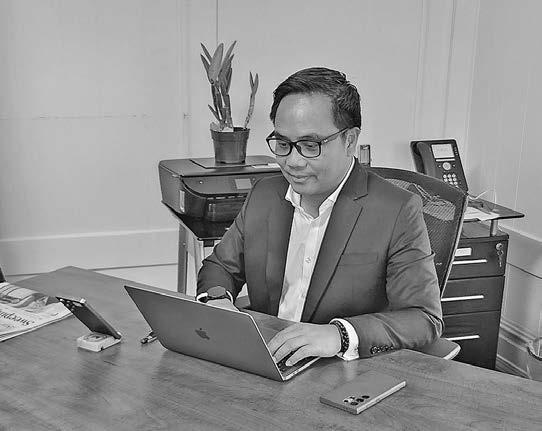
hattan and Ugly Kitchen in Manhattan’s East Village. While in the Northeast U.S., Talbo met with Fil-Am organizations of all kinds from professional associations, cultural folk arts and civic groups. During his short time in Hawaii, he’s already immersed himself in similar consular and community outreach in Hawaii.
A flagship project of the Philippine Consulate General in New York to promote Philippine cuisine is Filipino Restaurant Week. The Philippine Consulate General in Honolulu modeled its annual Filipino Food Week that Talbo will most likely continue. Filipino Food Week not only promotes Filipinos’ ancestral culinary dishes to mainstream Hawaii, but it also aims to bolster potential business between Philippine-based companies involved in exporting Filipino food products and ingredients
His top three priorities as new Consul General in Honolulu include the preservation and enhancement of national security, the promotion and attainment of economic security, and the protection of the rights and promotion of the welfare and interests of Filipinos overseas—all of which form the pillars of Philippine foreign policy, Talbo says.
Achieving these priorities will require a firm commitment to working with all stakeholders from the Filipino community, the community at large, the business sector and government.
“The Consulate and the Filipino community are partners in promoting the welfare of kababayan in the region and the interests of the Philippines,” he said. “It is therefore crucial
“The Consulate and the Filipino community are partners in promoting the welfare of kababayan in the region and the interests of the Philippines. It is therefore crucial that we all work together in the spirit of bayanihan and pagkakaisa so that we accomplish this mission. My message to the Filipino community is for all of us to continue doing the work that we have been doing these past decades to enhance economic, political and cultural development here in Hawaii. We should unite and work together—pakakaisa at bayanihan.”
– Arman R. Talbo Consul General at the Philippine Consulate General in Honolulu
that we all work together in the spirit of bayanihan and pagkakaisa so that we accomplish this mission.
“My message to the Filipino community is for all of us to continue doing the work that we have been doing these past decades to enhance economic, political and cultural development here in Hawaii. We should unite and work together—pakakaisa at bayanihan.
“With the Consulate and the community working together, we will build a brighter future for our kababayan in Hawaii. Nandito po and inyong Consulado para tumulong sa inyo.”
Several Hawaii residents who have met Consul General Talbo on several occasions are impressed with his demean-
Oahu residents, especially those in Wahiawa, are invited to the Wahiawa Public Library’s last day of service and closing event on Saturday, May 3.
The Wahiawa Public Library has been in service for the past 60 years. It will be replaced by a new library as part of the civic center development. The
construction is expected to begin as early as June.
On May 3, from 9am to 12pm, residents are invited to visit and say goodbye to the existing library building. Multiple activities will be held during the closing event, such as:
• Share a favorite memory on the memory wall
• Take selfies in front of
the photo banner featuring an exhibit called the Wahiawa Library: Past, Present and Future
• Visit dressed as your favorite comic book character and pick up a free comic in celebration of Free Comic Book Day
A special tribute commemorating the library’s
60 years of community service will begin at 11am, featuring several legislators and guests. Readers with holds and reserves with Wahiawa Public Library are advised to pick up their books at the branch by 4pm on May 3. After the branch closes, readers are asked to return borrowed materials
or. Mary Tom, a physical therapist from Ewa Beach, notes his leadership qualities and interpersonal skills.
“He is very accommodating, always smiling and polite,” she said. “He seems to be the type of person who builds strong relationships with staff and the public.”
Adela Salacup from Waipahu is confident Consul General Talbo will be an excellent diplomat.
“He seems to have already adjusted to the culture and customs here in Hawaii,” she said. “He is the type who can build positive relationships with business and government leaders. I have no doubt he is the ideal liaison for important matters between the Philippines and our state.”
to other public libraries until a temporary Wahiawa Public Library is opened in June.
The construction of the new library is anticipated to last for two years. The Hawaii State Public Library System plans to open a temporary library location in the Wahiawa Shopping Center.
For updates, visit librarieshawaii.org/branch/ wahiawa-public-library/.
By Gary Hooser
Given the current instability surrounding future federal funding of public schools, parks, university, medical services, and other vital programs, it’s completely inappropriate for Hawaii legislators to accept the generous 35% to 48% pay raises proposed by the Salary Commission.
Each rank-and-file state legislator presently receives a $74,160 salary for the honor of serving as a part-time public servant. Legislators work only five months per year on a full-time basis, and as much (or as little) as they choose during the other seven months of the year.
Per the US Census’ American Community Survey, the median salary for full-time workers in Hawaii is $60,680. Other data sources report similar figures.
So, half of Hawaii’s full-time workers earn $60,580 or less, while part-time legislators now earn $74,160, AND they’ll be getting raises of 35% to 48% – unless they take action now and vote to reject that raise.
Legislators may also collect a state retirement pension after only 10 years of service, and Neighbor Island legislators are paid an additional $225 per day during the four months of session; they’re not required to show actual expense receipts for this generous per diem allowance.
The decision to reject these pay raises would also prohibit the Governor’s office and Judiciary branch from receiving their pay increases recommended by the same Salary Commission.
It goes without saying that legislators, judges, and government execu-
tives should not be doing this work with expectations of big salaries. This work, after all, is public service.
Our legislature is faced with a decision: Either do nothing – thereby accepting the Salary Commission’s recommended pay raises without a vote – or “put the issue on the table,” which will mean holding public hearings and a public vote.
All indications point to the path of least resistance. They’ll likely keep their heads down and not hold any hearings or take any votes.
If pressed today on this matter, most legislators will point to the short time remaining in the legislative session. “It’s too late!” they’ll claim. “We don’t have time for the hearings necessary to reject the pay raises.”
Here’s the truth: Legislative rules could be
waived, hearings could be held, and the session could be extended if needed.
Obviously, legislative leadership wants to avoid a public vote on this.
Why? Because a public hearing would overflow with furious residents asking angry questions and demanding justification.
To be clear, there’s never a good time for politicians to give themselves a pay raise, either directly or indirectly.
But it’s hard to imagine a worse time than NOW.
President Trump and DOGE have been slashing and burning through almost every federal program on the books. Federal dollars that poured into Hawaii’s public programs are being drastically reduced.
We have an affordable housing crisis. We have families begging for help
By Dylan Bothamley
In a series of exhilarating matches at the 9th Asian Winter Games in Harbin, China, the Phil-
ippine men’s curling team etched their names into history by securing the nation’s first-ever gold medal in the competition.


The victory marks not only the nation’s first-ever medal in the Asian Winter Games but also the first gold medal won by any Southeast Asian country in the event’s history.
The Philippine men’s team is a new entrant to the world stage, having been accepted as a member of the World Curling Federation in September 2023.
The team consists of brothers Marc Pfister and Enrico Pfister, Alan Frei, Christian Haller, and alternate Benjo Delarmente, who also serves as the
with school lunches and affordable early childhood programs.
Of course, the legislature could step up to the plate. They could actually begin working fulltime, 12 months per year, and forgo their lucrative outside jobs. They could do any number of things to demonstrate the extra work they’d do to earn those raises – but so far, they haven’t.
No, it’s definitely not a good time to be giving yourself a raise.
Failing to hold a hearing, to have a public discussion, and to publicly vote on the issue does NOT give you cover to say, “But I didn’t actually give myself a raise.” Please don’t insult us. We know how these things work.
GARY HOOSER is a former Hawaiʻi State Senator and Majority Leader.
quickly realized he needed to pivot to another sport.
team’s president.
The Pfister brothers, along with Frei and Haller, were born to Filipino mothers in Switzerland. Their journey to forming a national team is fascinating.
The Pfister brothers and Haller had relatively accomplished backgrounds competing in curling and had discussed the idea of forming a Philippines national team, but interestingly, Alan Frei had only just begun curling at the start of 2023 when an intense weight loss journey led him to the sport.
Frei’s idea was to obsessively train in a Winter Olympics sport to both become fit and perhaps defy all odds and qualify for the Winter Olympics in Italy in 2026.
Frei first tried cross-country skiing but
“I started skiing and shared my Olympic ambitions with everyone. Only to find out that I was a terrible skier,” Frei wrote on his blog which covers his journey.
Haller got word of Frei’s Olympic ambitions and reached out to Frei and shared the idea of pursuing a Philippine men’s curling team in March of 2023.
Frei took to the challenge and would spend the next three months in rigorous training with a personal coach, Swiss professional curler Marcel Käufeler.
Despite Frei’s novice status, he progressed rapidly in skill. In June 2023, the aspiring team met in person for the first time and started practicing intensely together.
There was immediate team chemistry and Haller and the Pfister brothers (continue
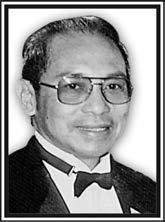
By Atty. Emmanuel S. Tipon
or shall any person be denied the equal protection of the laws.” –U.S. Constitution, 14th Amendment.
DEI means “diversity, equity, and inclusion.”
It was a program sponsored by the Biden administration into all aspects of the Federal government by “Affirmatively advancing equity, civil rights, racial justice, and equal opportunity is the responsibility of the whole of our Government.”
Executive Order 13985 Advancing Racial Equity and Support for Underserved Communities Through the Federal Government.
Briefly, it is “affirmative action”. It is the opposite of meritocracy, where federal employment practices “reward individual initiative, skills, performance, and hard work,” as pointed out in President Trump’s Executive Order.
The Trump administration ended DEI on January 20, 2025 with an Executive Order titled “Ending Radical and Wasteful Government DEI Programs and Preferencing”.
The Executive Order denounced the Biden Administration, saying that it “forced illegal and immoral discrimination programs, going by the name “diversity, equity, and inclusion” (DEI), into virtually all aspects of the Federal Government, in areas ranging from airline safety to the military.
This was a concerted effort stemming from President Biden’s first day in office, when he issued Executive Order 13985.
“Pursuant to Exec-
utive Order 13985 and follow-on orders, nearly every Federal agency and entity submitted “Equity Action Plans” to detail the ways that they have furthered DEIs infiltration of the Federal Government.
The public release of these plans demonstrated immense public waste and shameful discrimination. That ends today.
Americans deserve a government committed to serving every person with equal dignity and respect and to expending precious taxpayer resources only on making America great
Section 2 of President Trump’s Executive Order provides:
(a) The Director of the Office of Management and Budget (OMB), assisted by the Attorney General and the Director of the Office of Personnel Management (OPM), shall coordinate the termination of all discriminatory programs, including illegal DEI and “diversity, equity, inclusion, and accessibility” (DEIA) mandates, policies, programs, preferences, and activities in the Federal Government, under whatever name they appear.
To carry out this directive, the Director of OPM, with the assistance of the Attorney General as requested, shall review and revise, as appropriate, all existing Federal employment practices, union contracts, and training policies or programs to comply with this order.
Federal employment practices, including Federal employee performance reviews, shall reward individual initiative, skills, performance, and hard work and shall not under any circumstances consider DEI or DEIA factors, goals, policies, mandates, or requirements.”
Those dealing with the federal government – contractors and grantees of
federal funds – who had provided DEI training will now have to reverse course if they wish to continue dealing with the federal government.
Singapore and the Philippines
Singapore is a prime example of a government based on meritocracy. The Philippines is a prime example of a government based on “palakasan.”
DEI is akin to what Philippine President Ramon Magsaysay advocated when he said: “Those who have less in life should have more in law.” It is a nice thing to hear. But it denies the equal protection of the laws.
In the field of school admissions where the equal protection of the laws has been raised as an issue, the Supreme Court held that school admissions which take race or ethnic origin into consideration denies the equal protection of the laws. Students for Fair Admissions, Inc. v. President and Fellows of Harvard College, No. 20-1199, June 29, 2023.
The Court discussed the origins of the Fourteenth Amendment thus:
“Proposed by Congress and ratified by the States in the wake of the Civil War, the Fourteenth Amendment provides that no State shall “deny to any person . . . the equal protection of the laws.”
Proponents of the Equal Protection Clause described its “foundation[al] principle” as “not permit[ing] any distinctions of law based on race or color.”
Any “law which operates upon one man,” they maintained, should “operate equally upon all.”
Accordingly, as this Court’s early decisions interpreting the Equal Protection Clause explained,
the Fourteenth Amendment guaranteed “that the law in the States shall be the same for the black as for the white; that all persons, whether colored or white, shall stand equal before the laws of the States.”
“Eliminating racial discrimination means eliminating all of it. Accordingly, the Court has held that the Equal Protection Clause applies
“without regard to any differences of race, of color, or of nationality”—it is “universal in [its] application.” Yick Wo v. Hopkins, 118 U. S. 356, 369.”
The Court pointed out that “Many universities have for too long wrongly concluded that the touchstone of an individual’s identity is not challenges bested, skills built, or lessons learned, but the color of their skin. This Nation’s constitutional history does not tolerate that choice.”
According to Forbes magazine, “several American embassies urged foreign contractors to comply with Trump’s anti-DEI orders.”
For instance, Forbes reported that “ United Health Group removed webpages dedicated to diversity, equity and inclu-
sion and instead adopted language like ‘culture of belonging.”
Federal employment practices, union contracts, and training policies or programs must comply with President Trump’s Executive Order. Meritocracy lives.
SAMONTE TIPON was a Fulbright and Smith-Mundt scholar to Yale Law School where he was awarded a Master of Laws degree specializing in Constitutional Law. He graduated with a Bachelor of Laws degree from the University of the Philippines. He placed third in the 1955 bar examinations. He is admitted to practice before the U.S. Supreme Court, New York, and the Philippines. He practices federal law, with emphasis on constitutional issues, immigration law, and appellate federal criminal defense. He was the Dean and a Professor of Law of the College of Law, Northwestern University, Philippines. He has written law books and legal articles for the world’s most prestigious legal publishers including Thomson West and Lawyers Co-operative Publishing Co. and writes columns for newspapers. He wrote the case notes and annotations for the entire Immigration and Nationality Act published by The Lawyers Co-operative Publishing Co. and Bancroft-Whitney Co. (now Thomson Reuters). He wrote the best-seller “Winning by Knowing Your Election Laws.” Atty. Tipon was born in Laoag City, Philippines. Cell Phone (808) 225-2645. E-Mail: attorneytipon@gmail.com filamlaw@yahoo.com. Website: https://www.tiponimmigrationguide.com

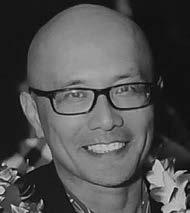
By Will Espero
The Trump administration continues its controversial ways and decisions with its expected tariffs that have disrupted stock markets and economies worldwide.
Retirees, investors, entrepreneurs, and countries are reeling as trillions of dollars have been lost due to the recently enacted tariffs Trump has imposed on countries globally. Our allies are stunned and appalled by Trump’s actions.
Tariffs are taxes that importers of foreign goods to the United States must pay. Foreign countries do not pay the tariffs.
In most cases, tariffs will be passed on to the consumers who purchase these goods.
Higher costs lead to inflatio,n which Trump said he would end once in office. It looks like the
opposite will occur, and a campaign promise has been broken.
We are now in a global trade war, and some economists even say we are in a recession. Consumer prices are expected to rise, and uncertainty by Wall Street paints a bleak future.
Trump claims the pain will be short-lived, and the economy and business investments will bounce back as he rewrites the tariff imbalance that has been imposed on the United States by her trade partners.
Trump wants to renegotiate the tariff situation with other countries, but his actions have caused countries to raise or impose tariffs, which could lead to an economic crisis worldwide.
Some countries want to negotiate tariffs with the United States, but the devastation caused by Trump will be difficult to fix in the short term. A tariff or trade war with China would be devastating economically.
Trump is risking his presidency with his tariff wars, and he risks losing
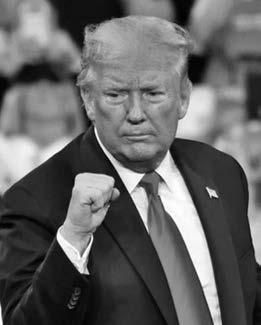
the mid-term elections for Republicans due to the disapproval of Democrats, Republicans, and independents of his policies, which seem to care little about retirees and the working people of our country.
Peaceful protests and civil unrest have erupted throughout our nation, with billionaire Elon Musk and his Tesla company feeling much of America’s anger. Federal firings, lack of due process for immigrants, treatment of veterans, defunding important programs and agencies, inappropriate texting, and constant golf outings have infuriated voters and constituents to the point where protests are now common in many towns and cities.
The cry of resistance is loud and getting louder.
Some individuals with disposable income are using this opportunity to reinvest in the stock markets as stock prices have dropped.
Some cynically say Trump is tanking the stock market so he and his wealthy friends can buy stocks at lower prices and acquire future gains in the long run.
Whatever the situation, many Americans are hurting, and the loss of their investment values and savings is painful and devastating.
Those who live paycheck to paycheck and those who live on a fixed income will be hurt the most. Rising prices will mean less buying power.
Low-income individuals, poor families, and blue-collar workers are suffering due to Trump’s policies. People will dip into their savings, and the quality of life for many will diminish.
This is the early legacy of Trump’s second term. Our hope now lies with
By by Jon Hochschartner
Eventually, the current fascist moment will pass. Perhaps it will take two years. Perhaps it will take twenty.
How long the moment lasts will be determined by the ferocity with which liberty-loving Americans fight the ongoing Republican power grab. But, at some point, this phony right-wing populism will exhaust itself.
When that day comes, Democrats must replace this vile outlook with a genuine, left-wing populism.
We need a populism which doesn’t blame the weak and the marginalized for society’s ills. Because it’s not transgender people or immigrants who are causing the public economic pain.
It’s the ultra rich.
After returning to power, in a demonstration of this new populist approach, Democrats should socialize the assets of President Donald Trump and his oligarch accomplice, Elon Musk.
Maybe one or both of them will have died by then. That’s not a problem. The property can be recovered from the fascists’ heirs.
I’ll be honest. I’m fundamentally an egalitarian.
The existence of billionaires in a country where people are struggling and in a world where people are starving is a moral affront to me.
That said, there is a non-socialist case for confiscating the wealth of these right-wing gangsters who presently control the government.
I shudder to imagine the damage Trump and Musk will have done to our country and democratic system by the time they are finished. Some kind of punishment will be necessary.
Taking away their grotesque fortunes is the very least Democrats could do. And just consider how that cash might benefit so many others.
Trump is reportedly worth almost $6 billion. Meanwhile, Musk, the richest man on Earth, is believed to be hoarding more than $421 billion.
The amount of good those riches could do in this nation and around the globe is hard to overestimate. We could build new hospitals, schools, libraries, roads and bridges.
We could expand our so-
Congress and the Courts. The Republican-led Congress must show courage and address Trump’s bad policies and decisions or risk losing future elections.
Congressional Democrats must fight back to stop or slow the bad policies.
The Courts must act and show they are not a rubber stamp of the president.
Checks and balances are necessary now, and the legislative and judicial branches must reel in the executive branch. To do nothing is not an option.
Much of what is happening is due to the United States Supreme Court giving Trump presidential immunity. It is one of the most terrible decisions the currently conservative Court has ever made.
WILL ESPERO retired from the Hawaii legislature after serving 19 years in the state House of Representatives and State Senate. He is currently a novelist, poet, and supporter of the arts. Lingering Thoughts provides a glimpse of his perspective on current events and issues
wealth – is our imagination.
cial-safety net to better care for children, the disabled and the elderly. We could provide free college tuition, forgive medical debts, or send out large stimulus checks. We could expand foreign aid to save countless lives amongst the poorest of the poor. We could invest in scientific development.
Animal welfare is a priority for me, so I’d love to see a portion of such funds go to cultivated-meat research. For those who don’t know, cultivated meat is grown from livestock cells, without slaughter. The revolutionary protein offers several environmental and public-health benefits as well.
The only limit to the variety of productive purposes – which we, as a society, could put Trump and Musk’s
Socializing the assets of this pair would be the right course of action, regardless of their behavior. However, the duo’s fascist criminality should make it an easy call for Democrats.
In the here and now, we must stop Trump and Musk.
But, in the aftermath, Democrats have to impose consequences of some sort.
At the very minimum, these should include confiscation of the pair’s outrageous fortunes.
We can build a better future. Money taken from fascist billionaires will help with this.
JON HOCHSCHARTNER lives in Connecticut. He is the author of a number of books, including The Animals’ Freedom Fighter: A Biography of Ronnie Lee, Founder of the Animal Liberation Front. Visit his blog at SlaughterFreeAmerica. Substack.com.

By Emil Guillermo
You live in Hawaii. You’re used to higher costs. But the Trump tariffs are going to hit us all where it matters most.
You don’t expect sticker shock at your local Philippine grocery store.
But I know I’ve wondered about the price of imported macapuno (coconut sport) or ube (purple yam) at five or six bucks a jar.
Would you stop buying imported authenticity if it went to eight to ten bucks a jar for a Philippine brand? It’s cheaper to just go home to make root beer floats, with vegan nondairy ice cream, of course.
This is the reality of Trump’s tariffs on Filipinos and other Asian Americans.
And maybe you saw it while shopping this weekend. It’s going to take a toll on the Asianness in all our lives.
But here’s where tariffs are really “tarrifying.”
At this point, nobody knows whether they’ll be permanent or if they’re just part of Trump’s bullying style of negotiation to get countries to kiss the ring.
We do know this. There will be pain. Trump won’t feel it. But we will.
Simply put, tariffs are a $50 dollar word for tax—a sales tax. You already pay a 4% sales tax in Hawaii. Ready for more?
If you buy imported goods (from food to clothing to electronics), a tariff will be part of the final cost you pay. And the cost will be built-in and be higher.
Trump has announced tariffs on nearly 200 countries that begin with a base of 10% on all imports, with reciprocal tariffs on the worst examples.
China is getting a re-
ciprocal tariff of 34%, but like in a poker game, China has said it will put on another 34% on the U.S. Trump has responded by saying he’ll raise his tariff by another 50%.
Lunacy or the art of the deal? I say more loony than art.
It’s hard to be precise about the cost to you in the end because tariffs are placed on a country, but the country doesn’t pay— the manufacturing company does.
And then it’s up to that company to eat the tariff or slip it onto you. Corporate self-interest being what it is, I’d say it’s all on you.
Sales taxes are the worst because they’re regressive, meaning everyone pays the same, rich and poor. Sounds fair, but an extra 2-2.5% price hike means nothing to a billionaire.
It’s more meaningful to the average family of four.
The Yale Economics Lab puts the cost of tariffs to that typical family at $3,800 a year.
The impact will be in almost everything you buy. Expensive sneakers will be even more expensive. Nike, which has manufacturing in Asia, could choose to focus on Asian markets if tariffs make their products too expensive for American consumers.
Another example: phones. One stock market analyst said Apple’s iPhones, which are already around $1,000 retail, could see prices go as high as $3,000.
And all this on the whim of one man hell bent on a trade war.
Golfs While The World Burns
In the meantime, in a time of world crisis, Trump showed how much he cares about us all.
In a move that is akin to Nero fiddling while
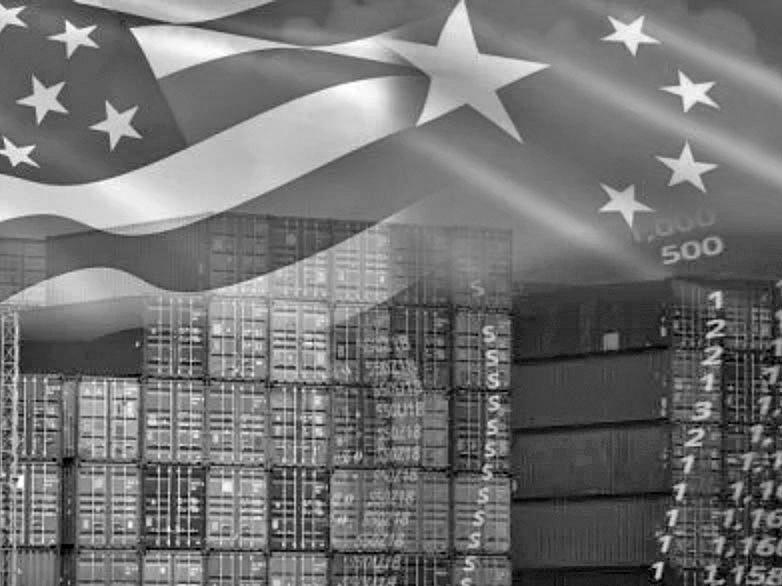
Rome burns, Trump went golfing.
Is this any way a world leader acts? Of course not.
But this is the real issue Americans must grapple with.
America is no longer the leader of the world’s global economy. Nor of… anything. Not anymore. That’s Trump’s desire. He said this week his image of America’s Golden Age is between 1873-1913.
Think of that. America was in post-reconstruction mode, America had no sense of civil rights, and the U.S. colonized the Philippines.
That’s more than 100 years. Trump is taking us back, not just chronologically but socially and economically as well.
And he’s flashing the era’s economic tool of choice, tariffs, which unfortunately also helped cause the Great Depression.
Do you see why at least a dozen Nobel Laureates in Economics disagree with Trump on trade? In the 21st Century, Trump acts like he’s in the 19th Century.
And he’s using bad math. Economists are condemning Trump’s equation used to derive trade imbalances with other countries. They don’t make sense. But his fake numbers justify him to call an emergency to wage tariffs.
He needs the emergency to sidestep Congress. But for how long?
At least four current Republican members of Congress are now chal-
the mantle of global economic leadership, when it forged alliances rooted in trust and mutual respect and championed the free and open exchange of goods and services is over. While this is a tragedy, it is also the new reality.”
That’s from an ally.
The upshot: America is no longer the leader of the free world.
lenging the president’s overreach of power.
Only Congress can impose taxes, but declaring an emergency has enabled Trump to levy what former VP Mike Pence has called “the largest peacetime tax hike in U.S. history.”
It’s bad, but even if Trump were to undo the tariffs, the damage is already done.
The world now sees the US not as smart nor as a trustworthy partner. And the suspicion goes beyond Trump and extends to the uninvolved, low-interest voters in America who put him back in office.
The wrongheaded global trade war has our closest allies wondering, WTF?
In the case of Canada, Trump imposed a 25% tariff on our closest ally, and Canada reciprocated with its tariffs on American cars.
Canadian Prime Minister Mark Carney spoke the blunt truth about America’s place in the world.
“The system of global trade anchored on the United States that Canada has relied on since the end of the Second World War, a system that, while not perfect, has helped to deliver prosperity for our country for decades is over,” Carney said the day after the tariff announcements.
“Our old relationship of steadily integrating with the United States is over. The 80-year period when the United States embraced
It’s a country run by a man who has started a wrongheaded trade war with the world and let everyone see his true ambition for America. To go backward, not forward.
Under Trump, the US no longer wants to be number 1. Trump’s USA wants to be isolated, alone, alienating all our former friends, and making everyone pay to kiss the ring.
In the meantime, the cost of everything goes up domestically for Americans.
If you’re one of those low-interest voters who voted for Trump because he was a businessman and promised to fix the economy, time to re-assess.
Trump is destroying the economy with higher prices, higher inflation and a precarious job situation to come. All that, plus a volatile stock market that lost more than $11 trillion in Trump’s first 11 eleven weeks.
We do know the disapproval rating on Trump’s tariffs are as high as 58%, according to one Wall Street Journal poll.
The recent “Hands Off” protests across the country show there are hundreds of thousands of people willing to take to the streets and push back against Trump.
If tariffs ignited the beginning of a “People Power” in America, that would be something.
EMIL GUILLERMO is a journalist and commentator. His talk show is on www.amok. com.
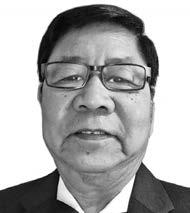
By Elpidio R. Estioko
With virtual platforms, internet search engines, media streaming platforms and digital/audible books, one may ask: What is the current-day significance of a public library?
As I see it, the public library is still vitally important and significant in serving the community despite living in the digital world of the 21st century.
It’s important that we need to continue patronizing our public library by promoting it and emphasizing the benefits library users can utilize.
The Santa Clara County Library District (SCCLD) is proud to announce that two librarians have been recognized with the Movers & Shakers Award by the literary publication Library Journal (LJ).
This honor highlights 50 individuals who are advocates, community build-
quickly brought Frei into the fold. On September 15, only three months after the team had first assembled, the World Curling Federation accredited the Philippines as a new Member Association.
Just a month later, the team competed in its first tournament in Prague, finishing in second place. In November of 2023, the team was granted entry to the B-division in the Pan Continental Curling Championships in Canada. They would finish second to China, a great accomplishment, but fell short of making it to the A-Division, a requirement for Olympic qualification.
In October 2024 the team would return to the Pan Continental Curling
ers, change agents, innovators, educators, and “ban battlers” who help move library work forward.
“Our 2024 Movers represent a range of innovative, proactive, and supportive work; they are imaginative and kind and brave in a world that needs those qualities—and the results they produce—very much,” said LJ Executive Editor Lisa Peet, according to Mariana Walker, Associate Communications Officer for the Santa Clara County Library District.
Library Services Manager Clare Varesio, the first recipient, served as the point person on two major health-related initiatives in 2023.
One of these projects was to partner with the County Behavioral Health Services Department and bring Mental Health Access programs to our libraries, empowering the public to access mental health services.
In addition, Varesio also helped to organize community workshops regarding naloxone (also
Championships in Canada. Although the team had only been competing for a year, they were already down to their last chance to keep the Olympic dream alive.
Failure to win promotion to the A-Division would foreclose on Olympic qualification. If the team’s tenuous status caused any jitters they were quickly forgotten as Curling Pilipinas, as they had come to be known, opened the tournament with dominant victories: 15-0 over Saudi Arabia, 10-2 over India, and 18-2 over Nigeria.
They would edge out formidable opponents Hong Kong and Kazakhstan on their way to sweeping the early sessions of
called Narcan), the anti-opioid overdose drug that can save lives if given to someone experiencing an overdose. Nearly 400 community members learned how to recognize an opioid overdose and how to safely administer the life-saving nasal spray.
Varesio has been with SCCLD since 2007, first as a Children’s Librarian, next as a Supervising Librarian, and then as the Community Librarian responsible for Cupertino Library, which is one of the largest and busiest in the SCCLD system.
She currently works out of the Services & Support Center as a Library Services Manager over Organizational Development and Partnerships.
Elizabeth Muñoz-Rosas, the second recipient, is one of the most popular librarians at Gilroy Library, where she serves as the Children’s Supervising Librarian.
Muñoz-Rosas has advocated effectively to bring materials, services and programs to her com-
the Championships.
In the elimination round, they once again faced Hong Kong in the semi-finals and won 6-1.
In the final match, they faced off against Kazakhstan who they’d narrowly beaten 6-5 in the first matchup, but with the goal of continuing their Olympic path so clearly in sight, Curling Pilipinas overpowered Kazakhstan 9-3 to claim the gold.
With first place secured, the team also won the coveted promotion to the A-division. The Olympic dream was alive.
With fresh hopes, the Philippine men’s team entered the 9th Asian Winter Games in Harbin, China which took place from February 7th to 14th.
munity that reflect the interests of all residents. Her advocacy for Spanish language materials ensures that library patrons see their lives and stories reflected in the collection.
She has also spearheaded programs of great relevance to the community of Gilroy. This includes working with the Smithsonian Institution’s Traveling Exhibition Service to bring the bilingual exhibit Dolores Huerta: Revolution in the Fields to the Gilroy Library.
More than 1,300 total visitors were able to enjoy this free exhibit. To coincide with the opening of the exhibit, Muñoz-Rosas organized a panel of distinguished speakers, including Dolores Huerta, to discuss the plight of the farmworker and Huerta’s legacy. More than 600 community members attended the program.
Muñoz-Rosas first began her career with SCCLD in 2007 as a part-time librarian at the Campbell Library.
County Librarian Jen-
On Frei’s blog, he noted: “This event is like the Olympics for Asia, and we will be proudly representing the Philippines.”
The Asian Winter Games featured the most daunting opponents the team had faced including the two-time gold medal-winning South Korea, Japan, and a rematch with China.
The Philippines men would finish the round robin phase 3-1 earning entry to the medal bracket.
In a rather stunning turn of events, Curling Pilipinas would soundly defeat Japan 10-4 in the quarterfinals. Japan was ranked 10th in the world at the time.
This set up a rematch with host nation China,
nifer Weeks said: “Clare and Elizabeth are truly talented and dedicated library staff who have worked tirelessly to improve their communities’ quality of life. While this is something we have always known, we are thrilled that they are both getting nationwide recognition. We hope their groundbreaking and inspiring work and advocacy encourage other library systems across the country to campaign for their patrons’ well-being, just as Clare and Elizabeth have done.”
Consequently, I would say, let’s continue patronizing the public library. They are there to serve us!
That’s perhaps, the reason why I served the Milpitas Public Library as a Library Education and Advisory Commissioner for 15 years as a member and eventually as chair for most of the years.
ELPIDIO R. ESTIOKO was a veteran journalist in the Philippines and a multi-awarded journalist here in the US. For feedbacks, comments… please email the author at estiokoelpidio@gmail.com
the reigning Asian Winter Games curling gold medal winners, who had beaten the Philippines in the finals of the Pan Continental Curling Championships a year earlier.
In the semi-final game, China established a 4-1 lead halfway through the match. However, the Philippine team, undeterred, embarked on a remarkable comeback.
They meticulously chipped away at China’s lead, and after the seventh end, they managed to bring the game to a tense 6-6 tie, setting the stage for a nail-biting final.
In the decisive eighth end, both teams executed high-quality shots. It came down to the final stone.
(continue on page 14)
By Sheryll Bonilla, Esq.
If you’re a grandparent with a life insurance policy who wants to leave the money to your grandchildren, consider using a trust.
If you name as beneficiaries the grandchildren who are already born, you may leave out grandchildren who are born later.
You might intend to leave the same amount of money to each of your grandchildren, but if you didn’t designate them on the policy, only the named ones will get your policy benefits and not the later-born grandchildren who are not named on the policy.
Create a trust for your family. You can direct that grandchildren who are born after you create the trust shall also be beneficiaries, in addition to the living ones who are named.
In your trust, you will name a successor trustee (the one who will manage the assets after you) who will collect your assets after you pass and hold them, and manage them for your family members.
In your trust, you can direct your trustee to distribute your property equally among your grandchildren (or in whatever proportions you want) or to hold it until they are old enough to be given the money.
Children cannot own money until they reach the age of 18. In your trust, you can name a higher age, such as “25” or a condition “after graduating from college”.
After creating your trust, give your life insurance company a copy of your short form trust and ask them to name your trust as the beneficiary of your policy.
After your death, your successor trustee will
contact the life insurance company to collect the policy proceeds.
The trustee will either distribute the funds if the grandchildren are legally able to receive the funds or place it in an account to hold until the children are old enough to be given the money.
If you do not have a trust and simply named the grandchildren as beneficiaries, those grandchildren you named to get your life insurance benefits have to be 18 years old or older to be given a check for their share of the policy.
If they are not 18 when they die, the life insurance companies will not pay for those children. The company will require a court to appoint a conservator who has the authority to receive the money on behalf of the child beneficiary.
That means the grandchildren’s parents will


have to start conservatorship cases in the probate court and ask to be appointed as conservators to collect the policy money.
Each child must have her or his case, so the costs can add up quickly if multiple grandchildren receive your policy proceeds.
Using a trust for life insurance avoids this thousands-of-dollars expense.
The petition for appointment as conservator has to give the court a proposed budget and schedule of assets.
Documents in the case are public records, so what you own and who you give it to is open information to persons who look at your case.
You can use a trust
for other assets, too, so that someone can hold and manage the assets for your grandchildren until they are old enough to inherit from you.
Again, the trust preserves your privacy by avoiding having to go to court because court documents are public records.
Don’t use a trust for anything related to retirement – annuities, IRAs, 401(k), 403(a), 403(b), SEPs, and the like.
Retirement accounts have to have human beings named as the beneficiaries.
The penalties for mistakenly naming a trust as beneficiary are too high – 39.6% loss, with no hope of getting any of it back.

By Rose Cruz Churma
The third edition of this wellloved book was finally released in 2023.
More than just a cookbook of Filipino-Chinese dishes, it also explores Chinoy (slang for Filipino-Chinese) culture and history.
This publication is a peek at the cuisine of the Fujian-based traders, merchants, and Chinese immigrants who made the Philippines their home.
In the introduction written by Clinton Palanca, it can be inferred that most of the Chinese who immigrated to the Philippines were from the province of Fujian, a province that lies on the southeast coast of China across the straits of Taiwan.
Fujian was a largely agricultural society with a strong military presence. During the years before the Communist Party came to rule China and closed it off from the rest of the world, as

its port at Fujian was a gateway to the rest of the world.
The late Doreen Gamboa Fernandez, the noted expert on Phil ippine cuisine, wrote a preface to this book that provided important in sight into how Chinese cuisine became embedded in Philippine culture.
She notes in her preface that Chinese merchants traded with the folks in the islands we now call the Philippines as early as the 8th century, although documentation of Chinese presence is only available by the 11th century.

the Filipino culture, to market food stalls, to eateries, pansiterias and upscale gourmet restaurants.
Some Chinese traders settled in the islands and had Filipino wives and children, thus, many Filipinos have Chinese origins and bloodline,s creating a culture referred to as Chinoy.
These developments had a major impact on Philippine food and life.
The book not only provides recipes for cooking but also documents the contributions of the Chinoys to the culinary heritage of the Philippines.
Well documented and illustrated, this publication will be of interest to those who love food—in whatever form or cuisine, but also to those who are curious and interested in the study of migration and its impact on identity and cultural assimilation.

The main author is Clinton Palanca, but aside from Doreen Gamboa, other guest writers are Jeffrey P. Yap, who wrote the piece on “Ysla de Binondo,” the area in Manila where pre-colonial Chinese traders rooted their presence in the Philippines.
Another guest writer is Mara Coson, who wrote “The Quiet Man” about her angkong, or grandfather.
In an anecdotal style, one gets a glimpse of the dynamics of a Filipino Chinese family and their reactions to food.
The same holds true for the essay by Rafael A.S.G. Ongpin titled “Binondo Sundays with Dad,” where he writes about his dad, Jimmy Ongpin, who kept a notebook “where he would write down details of every meal in every restaurant, in every city he visited.”
What makes this book exceptional is the writing of Clinton Palanca, which Grace Young (author of Stir Frying to the Sky’s Edge) describes as “poetic, poignant, and preserves the rich Chinese Filipino culinary heritage.”
This book takes us on a journey to kitchens of migrant Chinese families as they assimilate into
Well-kept family secrets on how to prepare recipes handed down through generations, secret techniques to prepare a dish, to anecdotes and adventures related to food—all these conspire to what Doris Magsaysay Ho of the Asia Society, Philippines calls “A fabulous, must have book…A culinary delight.”
Clinton Palanca, who passed away at age 45 in 2019, was a food writer who combined his historical and cultural observations from his travels and his interest in culinary arts into his narratives.
He is also a threetime Palanca Memorial Award Winner for two of his short stories and an essay. He graduated from Xavier School and received a BA in both Philosophy and English Literature at Ateneo de Manila University. He later took up an MS in Sociology at the University of Oxford and a Doctorate in Food Anthropology from SOAS University of London. He was a columnist for the Philippine Daily Inquirer as well as a few other online publications.
Neal M. Oshima, who is originally from Hawai’i, contributed the photographs for this book. He has photographed food for numerous books, some of which have won awards. Ginny Roces de Guzman, an award-winning chef and author of books on food, was responsible for recipe development. My favorite part of
the book is the section “This is How We Roll” or the description on how to make Chinese fresh lumpia—not really a dish but “a sacrosanct ritual.”
He calls the Fujianese lumpia an act rather than food. He notes that to “serve lumpia is a labor of love and to be invited to a lumpia party is a rite of inclusion.”
This brings back memories of when our grandmother would organize the young people of the house (usually during summer vacation when we’re spending time in the province) to help in prepping the raw veggies and then rolling cooked filling into these wraps with a frill of green lettuce at one end.
We’d end up with a variety of shapes—some very skinny or too bulky that the filling spills out.
After a while, we’d agree to just serve it as lumpiang hubad—just the filling sprinkled with the sweet and sour sauce with crushed peanuts and minced garlic.
Like serving fresh lumpia, this book is also a labor of love.
It is just fitting that the book’s publisher, Elizabeth Yu Gokongwei, dedicated this book to “our immigrant grandmothers and great-grandmothers who had to work daily at the stove. Their love for and loyalty to their families were best shown in the food they served.”
ROSE CRUZ CHURMA established Kalamansi Books & Things three decades ago. It has evolved from a mail-order bookstore into an online advocacy with the intent of helping global Pinoys discover their heritage by promoting books of value from the Philippines and those written by Filipinos in the Diaspora. We can be reached at kalamansibooks@gmail.com.
By Keli‘i Akina
Sometimes a situation looks better on paper — and that seems to be the case with Hawaii’s economic recovery from the devastating COVID-19 lockdowns.
According to Eugene Tian, chief economist of the Hawaii Department of Business, Economic Development and Tourism, the state’s economy “overall” has fully recovered.
But that’s not saying much. Hawaii continues to suffer anemic economic growth — the second slowest in the country — and that suggests there’s more we could do to help our local businesses rebound.
Unfortunately, Hawaii lawmakers often appear determined to do the opposite.
For example, HB202 as introduced would have increased the unemploy-
ment contribution tax on businesses by almost half as a result of redefining what comprises a healthy “adequate reserve fund” of the state’s unemployment insurance program from 100% to 150%.
The bill has since been stripped of a specific increase, and now also would require the state Department of Labor and Industrial Relations to study whether the multiplier should be increased at all, so maybe we’ve dodged a bullet. But still, the optics aren’t good.
Then there’s HB476, which proposed increasing the state’s capital gains tax — also by an unspecified amount. This bill remained in play for far too long before Senate lawmakers finally shelved it earlier this month.
Not only was the blank amount of the proposed increase worrisome, but capital gains taxes are associated with slow economic growth, especially because
they discourage diversification and the movement of capital in the state.
Lawmakers in both chambers, however, still seem to be insistent on increasing the state’s transient accommodations tax, which gets imposed on anyone who stays at local hotels or other short-term rentals.
As with the capital gains tax proposal, neither SB1396 or HB504 say what the increase they are proposing should be, but previous versions suggested an approximately 17% increase, from 10.25% to 12%.
Hawaii already has the highest tourism taxes in the world, and research shows that further increases are likely to have negative effects on tourism — which would impact everyone in the state who derives their income from visitor spending, whether directly or indirectly.
Instead of trying to wring more tax dollars out of the people who help fuel
our state’s economy, we should be looking at ways to make the state more attractive to investors and entrepreneurs.
In fact, the Grassroot Institute of Hawaii’s 2020 report “Road map to prosperity: How Hawaii can recover and even excel after the coronavirus lockdown” recommended that lawmakers consider temporarily reducing the TAT and other taxes that burden the retail, restaurant and tourism sectors.
Other business-friendly policies outlined in that report include permanently exempting food and medicine from the state general excise tax and deferring occupational licensing requirements — two ideas that regularly get shot down at the Legislature.
On the bright side, the Legislature has recently been more open to the report’s recommendation that more homebuilding be encouraged in urban areas.
Specifically, state law-
makers last year passed several key housing measures, including SB3202, which mandates that the state’s four counties allow at least two accessory dwelling units per residential lot.
The Legislature also passed a bill last year that will make it easier for cottage food businesses to operate across the state, and one that exempts doctors and dentists from paying the state general excise tax on payments received from Medicare, Medicaid and TRICARE — two other policy suggestions featured in the Grassroot report.
So while some progress is being made, it’s important to remind our legislators that they should be focused solely on increasing job opportunities, helping lower our cost of living and even producing more tax revenue for our state and county governments — not considering tax and fee hikes that will hinder our prosperity.
KELI‘I AKINA is president of the Grassroot Institute of Hawaii. three decades

By Seneca Moraleda-Puguan
“Tariff is the most beautiful word to me in the dictionary… because tariffs are gonna make us rich as hell,” declared President Donald Trump during the Inauguration Day parade at Capitol Hill Arena on January 20.
But what Mr. Trump calls “beautiful” now seems like the most dreaded word in the global vocabulary— sending stock markets spiraling and economies trembling.
“A vote for Trump will mean your groceries will be cheaper,” he promised on the campaign trail.
That promise has been broken.
Instead, prices on nearly all commodities—especially imported goods—are soaring. The American consumer is bearing the brunt.
“We’re gonna win so
much, you may even get tired of winning,” he once declared. “And you’ll say, ‘Please, it’s too much winning!’... But I’ll say, ‘No, it isn’t! We have to win more!’”
Yet, with the current state of global trade, no one is winning. Everyone is losing—and losing hard.
President Trump, in many ways, is a walking contradiction.
Lately, I’ve been watching more news on tariffs than the Korean dramas I usually binge.
In just a few days, I’ve absorbed more economics than I ever expected… learning how this trade war is anything but “beautiful.”
It’s not making America rich; it’s making its consumers pay more. Does President Trump truly believe other countries are the ones footing the bill?
(SPORTS CORNER: Curling ....from page 10)
The Philippines’ skip, Marc Pfister, delivered an expertly placed draw that knocked two of China’s potentially scoring stones out of the scoring zone, securing a single point for the Philippines, and clinching a dramatic 7-6 victory over China.
The win propelled the Philippines into the gold medal match.
The final confrontation pitted the Philippines against the heavily favored South Korean team, a squad that had handed the Philippines their sole defeat during the round-robin stage, and which was ranked 7th overall in the world curling rankings.
The early ends saw the Philippines seizing momentum, establishing a 3-1 advantage by the fourth end.
South Korea responded by securing single points in the fifth and sixth ends, leveling the match at 3-3.

In reality, it’s American importers—businesses and ultimately everyday citizens—who absorb the cost.
Even the logic behind the tariff formula they used to compute what other countries charge the US feels shaky, even to someone without a background in economics.
The math is misleading, and the rhetoric assumes the public won’t notice.
I’m not an American. I don’t live in America.
But I’m concerned, baffled, and anxious. Now that China has retaliated, the trade war is escalating, and its ripple effects are be-
In the critical seventh end, the Philippines executed a series of strategic plays, culminating in a well-earned point that nudged them ahead, 4-3.
The final end came down to defensive prowess.
The Philippines had managed to place a stone closest to the button and had set up a wall of four other stones blocking the scoring zone. South Korea’s only play was to attempt a daring shot, sending their final stone right into one of the Philippines’ defensive placements in an attempt to set off a cascade of carroms that might displace the well-guarded central stone.
But the defense was too strong, and the carrom failed, adding another point to the Philippines’ tally, and sealing a historic 5-3 triumph.
This fall the team will play in two seismic tournaments.
ing felt across the globe.
I live in Switzerland—a nation known for stability—but I know even we won’t be immune to the consequences of these decisions.
Build factories in America? Bring manufacturing back? That’s easier said than done.
Factories cost billions and take years to establish.
Does the U.S. have all the necessary raw materials? Can they afford to deport immigrants and still find labor for these industries? Will companies be willing to pay high wages to American workers?
I’m not an economist, but these are common-sense questions that need to be asked.
Trump wants to make America great again, but can greatness be achieved through isolationism? Through competition instead of cooperation? Through blaming allies and
First, when they return to the Pan Continental Curling Championships, now as part of the A-Division, where a fifth-place finish or better would qualify them for the World Championships.
Second, the Philippine men’s team will compete in an Olympic pre-quali-
fication tournament where a top-three finish would grant the team a berth in the Olympic Qualification Tournament.
The gold medal victory in the Asian Winter Games saw Curling Pilipinas defeat powerhouse teams, including two of the top 10 teams in the world. With
breaking ties?
I’m not even an American, but oh my—this is deeply troubling.
Even if we give him the benefit of the doubt and assume there’s a master plan, the question remains: How long can Americans endure the pain? How long before this “medicine,” as he calls it, begins to work—if it ever does?
Amidst the uncertainty, I remind myself not to place my hope in political leaders.
Yes, economies may falter, and the world may teeter toward recession, but my hope is anchored in the Lord—whose economy is not of this world, whose sovereignty remains unshaken, and whose plans never fail even when human leaders do.
Hopefully, this trade war remains a diplomatic issue and does not escalate into armed conflict. Lord, have mercy.
victory on such a grand stage, the Philippine men’s curling team has made a statement that their Olympic ambitions are within reach.
You can read Alan Frei’s chronicle of the team’s journey at https:// www.alanfrei.com/about/ olympics.
By Arcelita Imasa, Hawaii Filipinos for Truth, Justice & Democracy
f you are registered to vote in the upcoming Philippine elections, make sure to pre-enroll to do online voting.
Tama ang iyong nabasa, online na ang pagboto para sa eleksyon sa Pilipinas ngayong Mayo para sa ating mga Pilipino dito sa Hawaii.
First time mangyayari ang itong online overseas voting.
Kailan and paano ang pre-enrollment for online voting?
- Ngayon hanggang Mayo 7, 5:59am (Hawaii time)
- Pumunta sa https:// ov.comelec.gov.ph/enroll gamit and iyong cellphone
o computer.
- Pwede rin pumunta sa Philipine Consulate of Honolulu at gamitin ang special pre-enrollment kiosk para mag-pre-enroll.
Kailan naman pwede bumoto?
Bumuto mula Abril 13 hanggang Mayo 12! Pumunta sa website na ito para bumoto: https:// ov.comelec.gov.ph/vote.
(continue on page 15)
SPRING 2025 CULTURAL PROGRAM | Filipino Community Center | Various schedule until April 30, 2025 | FilCom Center, Consuelo Courtyard, 94-428 Mokuola Street, Waipahu | Join this comprehensive program this spring for an enriching journey through Filipino culture. The program fee is $25. To register, visit https:// filcom.org/communityprograms.
HAWAII TRIENNIAL 2025 | ALOHA NO | Hawaii Contemporary | February 15 to May 4, 2025 | Various locations across the state | Hawaii Triennial 2025 is the state’s largest, thematic exhibition of contemporary art from Hawaii, the Pacific, and beyond. For over 78 days, HT25 features 49 artists and art collectives with site exhibitions on Oahu, Maui, and Hawaii Island. For more information, visit hawaiicontemporary.org.
WAHIAWA PUBLIC LIBRARY CLOSING EVENT | Hawaii State Public Library System | 820 California Ave, Wahiawa, Oahu | May 3, 9am to 12pm | The Wahiawa Public Library’s last day of service will feature events that celebrate the library’s 60 years of service. Patrons are invited to the closing event. For updates, visit librarieshawaii.org/branch/ wahiawa-public-library/.
By Bermie Dizon
It’s that time of the Christian calendar when we reflect on the resurrection.
Our thoughts naturally go to that glorious morning when Jesus stepped out of the tomb, victorious over death. It was a breathtaking moment in history.
As we prepare our hearts for Resurrection, we’re reminded that Easter is not just about looking back—it’s about living in the power of what Jesus has done.
The resurrection is not only a triumph of the past; it is a present and living reality. Jesus didn’t just rise from the dead—He is the Resurrection, and He lives in us today.
This weekend, may we do more than remember.
The same power that raised Christ from the dead is available to bring new life to our brokenness, strength to our weakness, and hope to our ordinary moments. The risen Christ invites us not just to celebrate but to walk in resurrection life daily.
Yet, the power of the resurrection isn’t limited to that single event. It flows into the present, touching our everyday lives in ways both profound and simple.
As I look back over my life and the lives of others, I catch glimpses of resurrection power at work.
Resurrection is not just something that happened; it is Someone—alive and active—Jesus Christ. And where Christ is, resurrection is present.
In forgiveness, resurrection thrives. Bitterness, anger, and pain that once poisoned our hearts can find healing when we choose to forgive.
Forgiveness is a death to pride; a letting go of past wounds. In its place, new life begins to grow— healing, peace, and reconciliation. Jesus, the Resurrection, breathes life into relationships once thought dead.
“Be kind and compassionate to one another, forgiving each other, just as in Christ God forgave you.”
— Ephesians 4:32 (NIV)
In healing, resurrection is evident. Physical recovery, emotional renewal, and spiritual revival all testify to His power. I remember times when I felt overwhelmed by grief, burdened by loss, or struggling with physical limitations. Yet, in those dark moments, God’s resurrection power gave me strength, endurance, and even miraculous healing. Jesus, the Resurrection, meets us in our weakness.
“But he said to me, ‘My grace is sufficient for you, for my power is made perfect in weakness.” — 2 Corinthians 12:9 (NIV)
In encouragement and comfort, resurrection is active. When I sit with someone who is hurting and offer words of hope, I participate in the life-giving work of Jesus. He uses our voices to speak words that revive weary souls and restore hope. Jesus, the Resurrection, speaks life through our words and actions.

“Therefore encourage one another and build each other up, just as in fact you are doing.” — 1 Thessalonians 5:11 (NIV)
Even in the ordinary moments, resurrection is there. When I tend my garden, pulling weeds and nurturing plants, I see life springing up from the ground—a living picture of resurrection.
When I teach my ESL (English as a Second Language) students and watch them grasp a new word or concept, it’s like seeing light break through the darkness.
When I share the good news with those struggling through life, telling them that Jesus is the answer to
their deepest questions and the solution to their problems—resurrection life happens.
The risen Christ dwells in us, filling our lives with His presence.
Every act of kindness, every moment of grace, every whisper of hope is a touch of resurrection. What seems small or insignificant is often where His life blooms most brightly.
“I have been crucified with Christ and I no longer live, but Christ lives in me. The life I now live in the body, I live by faith in the Son of God, who loved me and gave himself for me.”
— Galatians 2:20 (NIV)
The power of the resurrection is not limited to
(PHILIPPINE NEWS: Paalala ....from page 13)
Para sa mga katanungan
- Mag-email sa honolulupcg.overseasvoting@ gmail.com
- Maari din tumawag sa (808) 253-9446
- O kaya bumisita sa Philippine Consulate of Honolulu, 2433 Pali Highway, Honolulu.
Bakit dapat bumoto? Why vote?
Mababa ang voter turnout o bilang ng mga bumoto noong 2022. Sa Hawaii, 34% ang voter turnout (2,890 out of 8,444
registered voters cast their ballots). Maraming factors noon kasama na dito ang COVID-19 pandemic.
Pero ngayong 2025, intention o hangarin ng pag-convert sa online voting ang mapataas ang voter turnout. We encourage everyone registered to vote to exercise their right to vote. Mahalaga ang iyong boto! Napateg ti botos tayo! Your vote matters!
Ang pagboto ang isa sa mga paraan para maipagpatuloy ang koneksyon na-
a distant past or a future hope.
It is here and now, working in your life through forgiveness, healing, encouragement, comfort, and countless small acts of love and grace done in Jesus’ name.
The resurrection is in us because Christ is in us.
Prayer:
Lord Jesus, thank You for being the Resurrection and the Life. Thank You for revealing Your power not only in grand, miraculous moments but also in the small, everyday acts of love and grace. Help me to see Your resurrection at work in my life—in forgiveness, healing, encouragement, comfort, and even in the mundane. Thank you for your presence in every part of my life. Amen.
BERMIE DIZON is a retired pastor of Grace Communion International (GCI), Glendora, CA and a former writer for USA Tribune for nine years. He is also the author of the book “God, In Every Step” which is now available at Amazon, Barnes and Noble, and other outlets.
tin sa Bayang Mahal. Ito rin ay isang paraan para maipakita natin na ayaw natin ng korapsyon at mga pulitikong ginagawang negosyo ang kanilang pwesto sa gubyerno!
Paraan ito para masabi natin na gusto natin ng trabaho at tamang pasahod, edukasyon, pabahay, lupang masasaka, at marami pang karapatan, at labanan ang kahirapan.
Kaya tara at mag-preenroll na para sa darating na Online Voting sa Eleksyon sa Bayang Mahal 2025!
